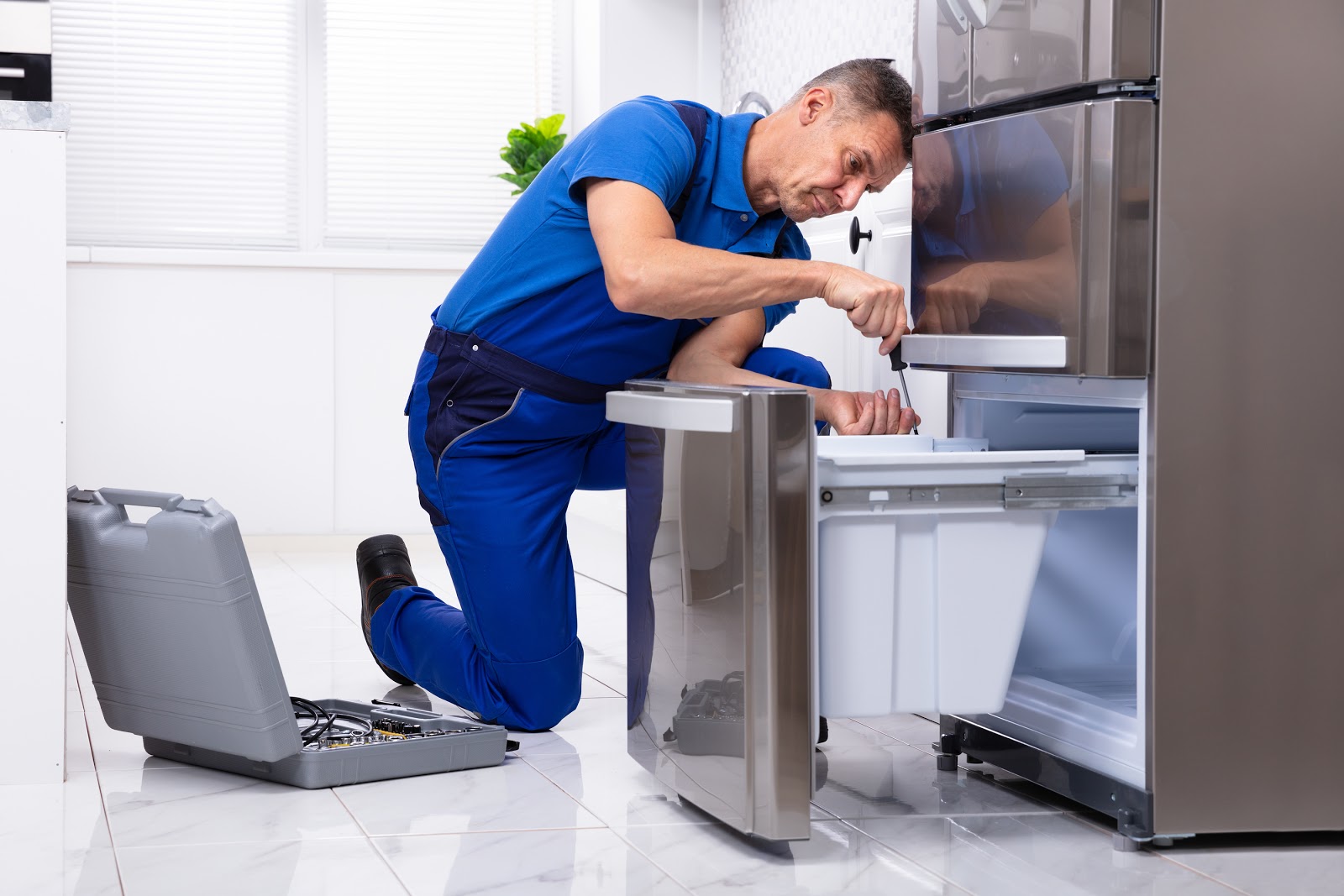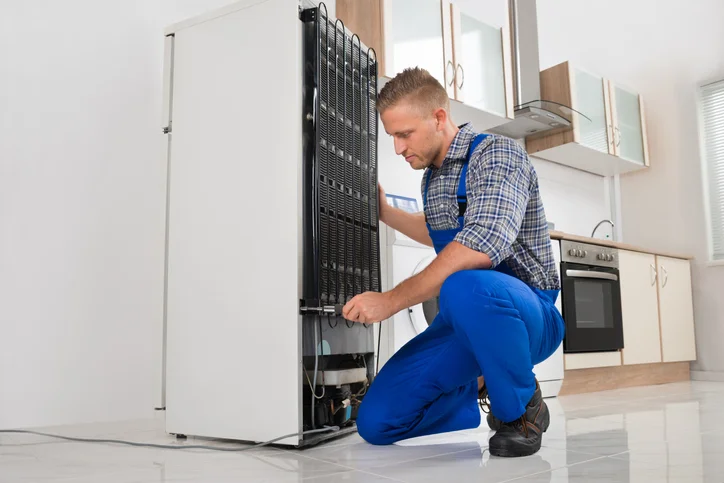Why Refrigerator repair experts Dependable Refrigeration & Appliance Repair Say Energy Spikes Could Mean a Failing Fridge
Why Refrigerator repair experts Dependable Refrigeration & Appliance Repair Say Energy Spikes Could Mean a Failing Fridge
Blog Article
Essential Tips for Effective Ref Repair to Prolong Appliance Life Expectancy
When it comes to your refrigerator, correct repair work and maintenance are vital for durability. Recognizing typical problems and knowing when to act can make all the difference.
Comprehending Common Refrigerator Issues
Fridges are vital in keeping your food fresh, yet they can run into a series of common issues that disrupt their efficiency. One constant issue is insufficient air conditioning. If you observe food spoiling quicker than typical, check the thermostat setups or take into consideration if the door seals are damaged. An additional typical trouble is extreme noise, which might suggest a malfunctioning compressor or a falling short fan. You might additionally experience water merging inside or underneath the refrigerator; this commonly results from a clogged up defrost drain or a damaged water line. In addition, if your fridge's light isn't functioning, maybe a basic light bulb problem or a problem with the door switch. Ultimately, ice accumulation in the freezer can hinder air movement and cooling down effectiveness. Identifying these concerns early can conserve you time and money out of commission, ensuring your refrigerator runs efficiently and effectively.
Regular Maintenance Practices
To maintain your home appliances running smoothly, you need to remain on top of routine maintenance practices. Clean the condenser coils, inspect the door seals, and keep an eye on the temperature setups to guarantee peak efficiency. These simple jobs can save you money and time on repair work down the line.
Tidy Condenser Coils Frequently
Cleaning your condenser coils routinely can substantially boost your device's effectiveness. Dust and dust develop up on these coils over time, creating your appliance to function harder and eat even more energy. To maintain them clean, disconnect your device and thoroughly get rid of any safety covers.
Examine Door Seals
3 simple actions can aid you guarantee your device's door seals are in great problem. First, evaluate the seals routinely for any kind of cracks, rips, or indicators of wear. These damages can lead to air leaks, impacting effectiveness. 2nd, clean the seals using cozy, soapy water to eliminate any debris or crud. A clean seal ensures a tight fit and much better efficiency. Ultimately, execute a basic test by closing the door on a notepad. If you can easily draw it out without resistance, the seal may need replacing. By complying with these steps, you'll preserve your appliance's performance and longevity, conserving you cash on power costs and fixings over time.
Display Temperature Setups
Routinely checking your device's temperature level settings is important for best efficiency and performance. Whether you're handling a fridge, fridge freezer, or stove, watching on these settings can prevent several concerns. For refrigerators, go for temperatures between 35 ° F and 38 ° F; for freezers, stick around 0 ° F. If the temperature levels are too expensive or low, your appliance may function harder, squandering power and shortening its lifespan. Use a thermostat to check these settings routinely, specifically after significant modifications, like moving your device or changing the thermostat. If you discover fluctuations, readjust the settings appropriately and speak with the individual handbook for guidance. By remaining aggressive about temperature tracking, you'll ensure your appliances run efficiently and last much longer.
Repairing Air Conditioning Concerns
When your refrigerator isn't cooling down properly, it can result in ruined food and wasted money, so attending to the concern quickly is vital. Beginning by checking the temperature level settings to validate they go to the suggested levels, generally around 37 ° F for the refrigerator and 0 ° F for the freezer. If the settings are correct, examine the door seals for any voids or damage; a damaged seal can permit cozy air to go into.
Following, check out the vents inside the refrigerator and freezer. Confirm they're not blocked by food items, as this can disrupt air movement. Pay attention for the compressor; if it's not running or making uncommon sounds, it may require interest. Inspect the condenser coils, generally situated at the back or base of the device. Dust and particles can collect, causing cooling issues. Tidy them with a vacuum cleaner or brush to enhance performance. If issues continue, it may be time to call an expert.
Dealing With Water Leakage and Ice Accumulation
If you're managing water leak or ice accumulation in your home appliance, it's vital to identify the source of the trouble. By pinpointing where the water is coming from, you can avoid additional concerns and stay clear of expensive fixings. Allow's check out some effective methods to deal with these typical problems.
Determine Leakage Sources
Just how can you properly recognize the sources of water leakage and ice accumulation in your devices? Start by examining the seals and gaskets on your refrigerator and fridge freezer doors. A worn or broken seal can allow cozy air to get in, creating condensation and ice. Next, check the drainpipe frying pan and drain system for clogs or clogs; a backed-up drain can lead to view it water merging. Look for any kind of loose connections in the water supply line, which can develop leaks. Take a look at the defrost drainpipe for look at these guys ice buildup, which could disrupt correct drain. By systematically examining these locations, you'll pinpoint the source of the trouble, permitting you to take the needed steps to fix it and expand your home appliance's life expectancy.
Avoid Ice Development
To avoid ice formation in your appliances, start by confirming the temperature setups are suitable. If your refrigerator or fridge freezer is as well cold, it can result in too much ice accumulation. Check the door seals routinely; damaged seals can let warm air in, triggering condensation and ice development.
Keep the device well-ventilated and avoid overcrowding, as this can block air movement - Best Appliance Repair Company In Oro Valley Dependable Refrigeration & Appliance. Regularly defrost your freezer if it doesn't have an automated defrost attribute.
If you discover water leakage, identify and fix any type of blocked drainage holes, as they can add to ice accumulation. Tidy the coils and validate they're working appropriately to keep peak performance. Taking these actions will assist extend your appliance's life-span and effectiveness.
Dealing With Noisy Refrigerator Sounds
While it could seem alarming, a loud refrigerator commonly indicates small problems as opposed to major malfunctions. Determine the source of the noise. Typical offenders consist of the compressor, fans, and water lines. If you hear a buzzing noise, it could be the compressor striving; this might simply be a regular procedure noise.
Next, examine for loosened items inside. Sometimes, containers or racks can rattle, producing undesirable noise. Tighten up or reposition them to get rid of the audios.
If you discover a clicking sound, it may be the defrost timer. This is commonly harmless yet could indicate it needs inspection.
Ultimately, validate your refrigerator is degree. An out of balance device can create resonances and sound. Utilize a level to inspect, and readjust the feet if required. Dealing with these issues without delay can assist maintain your fridge's performance and extend its lifespan.
When to Change Parts vs. Full Replacement

However, if your home appliance is older and experiencing multiple concerns, a complete substitute can be a lot more cost-effective. Think about the expense of repair services versus the appliance's worth. If fixings exceed 50% of a new device's rate, it's typically better to purchase a substitute. Additionally, if you discover ongoing issues that keep recurring, it's an indicator that your appliance has reached the end of its life. Consider these variables thoroughly to make the most effective choice for your needs and spending plan.
Recognizing When to Call a Professional
Exactly how can you tell when it's time to call in a professional for appliance fixing? If you notice uncommon sounds, scents, or leaks, it's a clear signal that something's incorrect. Do not overlook these indicators; they typically suggest deeper concerns. If your device quits working completely or often trips circuit breakers, it's one more red flag.
You should likewise consider your own comfort level with repairs. If you're not sure about diagnosing the problem or lack the right devices, it's finest to connect for aid. Bear in mind, trying complex repair services can lead to more damage or perhaps safety and security dangers.

Often Asked Inquiries
How Frequently Should I Clean the Fridge Coils?
You need to clean your fridge coils every six months. This helps preserve performance and stops getting too hot. If you see extreme dirt or pet dog hair, clean them more regularly to guarantee your fridge runs efficiently.

Can I Use Vinegar for Cleansing My Refrigerator?
Yes, you can utilize vinegar to cleanse your refrigerator! It's an outstanding natural cleaner that gets rid of odors and discolorations. Dependable Refrigeration & Appliance Repair Service LG Appliance Repair. Just mix it with water, apply it to surfaces, and clean down for a fresh, tidy refrigerator
What Temperature level Should My Refrigerator Be Ready To?
You must establish your refrigerator to 37 ° F(3 ° C) for excellent food conservation. This temperature maintains your food fresh while avoiding wasting, guaranteeing your grocery stores last longer and decreasing waste. It's a simple adjustment you can make!
Does a Fridge Need to Be Leveled?
Yes, your refrigerator needs to be leveled. If it's unequal, it can influence cooling down efficiency and cause excess sound. Check the leveling legs and change them to assure proper equilibrium for ideal efficiency.
How Can I Lower Fridge Energy Intake?
To minimize your refrigerator's power consumption, keep it tidy and well-ventilated, inspect door seals for leaks, set the temperature between 35-38 ° F, and stay clear of overloading it. These actions can substantially reduce your energy expenses.
Report this page